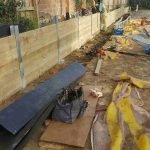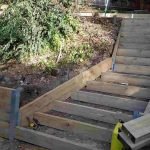Introduction
Retaining walls are more than simply a practical option for handling soil and preventing disintegration; they're likewise an aesthetic enhancement to your landscape. Whether you're dealing with a steep slope, producing terraced gardens, or just aiming to improve the total look of your Tuff Stuff Retaining Walls home, working with the ideal retaining wall professional is crucial for accomplishing the desired outcome. This guide will walk you through everything you require to understand about employing a retaining wall specialist in your area, making sure that you make a notified decision.
What is a Maintaining Wall?
Before diving into the specifics of hiring a professional, it's vital to understand what a retaining wall is and its numerous kinds. A retaining wall is designed to hold back soil and prevent erosion while providing structural support. They come in numerous materials, consisting of:
- Timber Sleeper Retaining Walls: Often made from dealt with wood or recycled materials, these walls are popular for their natural look and ease of installation. Concrete Sleeper Retaining Walls: Understood for their sturdiness and strength, concrete sleepers can withstand substantial pressure and last longer than other materials. Brick Retaining Walls: These walls use a classic appearance and can be tailored to fit different designs. Stone Retaining Walls: A natural choice that blends seamlessly into landscapes, stone walls provide both functionality and beauty.
Understanding these alternatives will help you communicate successfully with your picked retaining wall contractor.
Why You Need a Professional Retaining Wall Contractor
1. Know-how in Design and Materials
An expert retaining wall specialist has the understanding to suggest ideal materials based on your specific landscape requirements. Whether it's choosing between timber sleeper or concrete sleeper keeping walls, their know-how guarantees that the structure is not just functional however also aesthetically pleasing.
2. Code Compliance
Building regulations often determine how maintaining walls must be built. A skilled retaining wall contractor comprehends these codes and will guarantee that your project complies with local regulations.
3. Threat Mitigation
Constructing a retaining wall involves different threats such as soil failure or water drain problems. A certified professional has experience dealing with these obstacles effectively.
Your Go-To Guide for Working With a Retaining Wall Professional Near Me
Finding the best contractor may seem complicated, however breaking down the procedure makes it manageable. Here's how you can go about it:
1. Research Study Resident Contractors
Start by browsing online for "retaining wall specialist near me." Try to find professionals with good reviews and rankings on platforms like Google My Business or Yelp.
2. Ask For Recommendations
Word-of-mouth referrals from buddies or family can lead you to trustworthy professionals who have actually formerly delivered outstanding work.
3. Inspect Qualifications and Experience
Ensure that the specialists you're thinking about have correct licenses and insurance. Their experience ought to line up with the specific kind of retaining wall setup you need-- be it brick, stone, or concrete sleeper.
4. Request Quotes
Obtain comprehensive quotes from multiple professionals outlining labor expenses, product expenditures, and job timelines. This comparison will assist you determine market rates.
5. Review Portfolios
Ask potential contractors for portfolios showcasing previous projects similar to yours. Visual proof of their work can increase your self-confidence in their capabilities.

6. Interview Candidates
Don't shy away from asking questions during interviews; ask about their approach to style, product choice, job timelines, and guarantee services used post-installation.
The Value of Product Selection in Retaining Wall Construction
Choosing the best products can significantly impact both performance and looks. Let's dig deeper into some popular choices:
Timber Sleeper Retaining Wall: Pros and Cons
- Pros: Eco-friendly alternative; easy to set up; cost-effective. Cons: Susceptible to rot; needs routine maintenance.
Concrete Sleeper Retaining Wall: Pros and Cons
- Pros: Lasting; resistant to climate condition; very little upkeep required. Cons: Higher initial expenses compared to lumber options.
Brick Retaining Wall: Pros and Cons
- Pros: Ageless appeal; long lasting; customizable. Cons: Labor-intensive installation; capacity higher expenses depending on style complexities.
Stone Retaining Wall: Pros and Cons
- Pros: Natural charm; strong structural integrity. Cons: High expense; needs experienced labor for installation.
Understanding these pros and cons enables house owners to collaborate efficiently with their picked retaining wall installer Melbourne when making decisions concerning construction materials.
How Much Does It Cost to Employ a Retaining Wall Contractor?
The expense of working with a retaining wall specialist varies commonly based on several factors:
Type of Material Utilized: As seen above, lumber might be less costly at first compared to stone.
Wall Size: Larger walls require more materials and labor time.
Site Preparation Needs: If extensive grading or earth-moving is required before installation begins, this will increase total costs.
Labor Charges: Rates might vary based upon place (for example, retaining wall installation Melbourne might vary in prices compared to rural areas).
On average, property owners may invest in between $15-- $50 per square foot for product costs alone, plus additional labor fees varying from $40-- $100 per hour depending upon complexity levels involved in your project scope.

FAQs About Working with a Retaining Wall Specialist Near Me
Q1: How do I find trustworthy retaining wall home builders near me?
A1: Start by browsing online evaluations and asking pals or household for recommendations while examining qualifications thoroughly before making any decisions.
Q2: What allows do I need for my retaining wall project?
A2: Licenses vary by area however usually consist of zoning clearance if over 4 feet high; seek advice from local city policies prior beginning building work!
Q3: Can I set up a retaining wall myself?
A3: While do it yourself setups are possible depending upon complexity level & & material choice (e.g., wood), expert assistance makes sure safety & & code compliance particularly if handling larger structures!
Q4: For how long does it take to finish a normal installation?
A4: The timeline varies based on size & & intricacy however usually varies between 1-3 days once excavation preparations are done adequately!
Q5: What maintenance is required after installation?
A5: Regular examinations should happen every year inspecting drainage systems & & repairing any damage promptly extending life-span significantly!
Q6: Will my home value increase after setting up a brand-new retention system?
A6: Yes! A visually pleasing durable structure improves curb appeal which translates directly into increased residential or commercial property worths over time!
Conclusion
In conclusion, employing the best retaining wall specialist near you is vital when considering setting up any kind of retention system at home! By comprehending types available (lumber vs concrete sleeper vs brick), evaluating credentials appropriately through research study methods detailed previously in this guide-- you'll be equipped with whatever needed before taking that plunge towards transforming landscaping efforts into truth! Do not forget-- this financial investment not just protects versus erosion however improves visual appeal too-- making all those hours spent outside a lot more pleasurable understanding that effort settled greatly!
So remember-- take your time during selection processes while keeping sight focused securely ahead towards building something remarkable together with professionals who share very same vision! Delighted building!